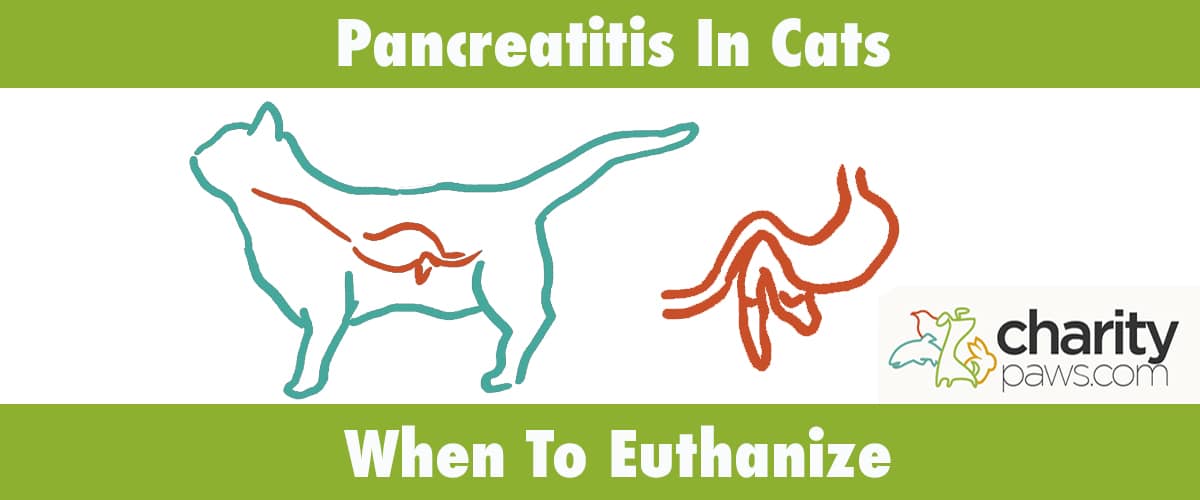Pancreatitis is a painful gastrointestinal condition that impacts many feline friends.
Not only is this an excruciating condition for a cat to endure, but it can be fatal if it is not treated promptly and effectively.
So what is pancreatitis in cats, and what does this diagnosis mean for your cat going forward?
In this article we will discuss the details of pancreatitis in cats, the treatment options available and when it may be time to say goodbye.
The Role Of The Pancreas In Cats
Before we discuss the details of pancreatitis in cats, it’s important to first understand the role of the feline pancreas.
To better understand the organ’s role, let’s break it down by both endocrine and exocrine functions.
The endocrine pancreas produces multiple hormones, with the main ones being insulin and glucagon.
Both hormones are responsible for regulating blood glucose levels, which is ultimately essential for survival.
The exocrine pancreas aids in digestion by producing enzymes that are delivered directly to the intestinal tract.
These enzymes help to break down everything from protein, to fat, to carbs.
As you can see, the pancreas plays a role in a few major body processes.

What Is Pancreatitis?
Now that you understand the importance of the feline pancreas, we can begin to go into the details of pancreatitis itself.
The term pancreatitis refers to inflammation of the pancreas organ, causing a slew of dangerous complications to follow.
As we mentioned above, the pancreas is responsible for creating digestive enzymes that assist in breaking down food.
In a cat free of pancreatitis, these enzymes will be sent directly to the intestines to begin their work.
However, when a cat has inflammation of the pancreas, these digestive enzymes can begin to seep into the pancreas and the surrounding tissues.
If these digestive enzymes are activated prematurely by localized inflammation, the enzymes can begin to “digest” any tissue they come in contact with.
This not only causes significant inflammation and pain for the cat affected, but it can lead to significant damage to the pancreas and surrounding organs.
Cats can even develop hemorrhagic pancreatitis due to the severity of tissue damage.
What Causes Pancreatitis In Cats?
There is not yet a concrete cause of pancreatitis in our feline friends.
Most cases of pancreatitis occur suddenly and without a known trigger, making it complicated to identify the primary source.
Though we don’t have an exact answer, there are a list of potential factors that may be behind the development of this condition.
Some of the potential cause of pancreatitis in cats include:
- Eating foods high in fats
- Trauma or recent surgery to the abdomen
- Bacteria in the intestines
- Inflammatory bowel disease
- Intestinal parasites
- Toxicities
- Reactions to medication
- Infectious disease
- Liver disease
- FIP
In most cases of feline pancreatitis, it is impossible to identify the exact cause of their acute illness.
This is why in addition to treating your cat for this condition, your veterinarian may perform multiple diagnostics to rule out other complications.
Is Pancreatitis Painful For Cats?
Yes, pancreatitis is likely incredibly painful for the cat affected.
My cat was diagnosed with pancreatitis a few years ago after a stressful move, and I can remember the pain he was in each time his abdomen was touched.
As you can imagine, digestive enzymes leaking into your abdominal cavity must be unbearable.
What Are The Signs Of Pancreatitis In Cats?
Most cases of pancreatitis will occur suddenly in an otherwise healthy cat.
Many owners notice a sudden decline in their cat’s health, followed by an array of concerning symptoms.
Some of the most common signs of pancreatitis in cats include:
- Anorexia
- Vomiting
- Drooling
- Diarrhea
- Lethargy
- Abdominal pain
- Fever
- Weakness
If you notice any of the above symptoms in your cat, we suggest having them seen by your veterinarian immediately.
Cats with pancreatitis can decline rapidly, so it’s important to seek care from the moment symptoms develop.
Diagnosing Pancreatitis In Cats
There are a few diagnostic tools that your veterinarian can rely on if they fear pancreatitis in your cat.
Most vets will typically perform both a full panel of blood work and a pancreatitis snap test, as these can offer a full picture of what is occurring metabolically.
The full panel of blood work can reveal any elevated white blood cell counts, elevated lipase levels, as well as any damage to the liver.
The snap test is an in house test that measures the pancreatic enzyme levels specifically and will show up as either normal or abnormal.
Based on these results, your vet will typically feel comfortable with diagnosing pancreatitis in your cat.
In complicated cases of pancreatitis, your veterinarian can suggest performing an abdominal ultrasound.
This can assess the level of inflammation present in and around the pancreas, as well as whether or not any hemorrhage is present.
An ultrasound is especially common if your cat is not improving with initial treatment, or if you have a cat that suffers from chronic pancreatitis.
Can You Treat Pancreatitis In Cats?
Most cases of mild to moderate pancreatitis can be treated with immediate veterinary care.
The main goal is to take the stress of the pancreas and give the organ a break, allowing the pancreas to stop releasing the digestive enzymes.
This means that all food should be withheld as your vet stabilizes your cat, tending to the painful symptoms their condition has caused.
In most cases of feline pancreatitis, your veterinarian will recommend that your cat stays in the hospital.
This will allow your veterinarian to administer IV fluids, IV pain control, antiemetics, antibiotics, and any other supportive care your cat requires.
Once your cat is stabilized and their nausea is under control, your vet may then introduce a bland diet into their treatment protocol.
If your cat only has a mild case of pancreatitis, your vet may feel comfortable treating them on an outpatient basis.
This will typically involve offering fluids under the skin, giving them an initial injection of nausea and pain control, and sending you home with medications ranging from antiemetics to antidiarrheals.
Your veterinarian will also send you home with a bland diet that should be offered when your cat is stabilized, and even instructions on how to syringe feed them if needed.
The standard treatment time for pancreatitis in cats will vary, as every case can range in severity.
However, no matter how minor your cat’s case is, you can typically expect to offer them treatment for a minimum of 7 days.
In most uncomplicated cases of feline pancreatitis, the cat will recover within 14 days.
Chronic Pancreatitis In Cats
Unfortunately, some feline friends will develop chronic pancreatitis after their initial illness.
This basically means that they can experience occasional flare ups of pancreatic inflammation, leading to the same GI upset and pain they experienced before.
Not all cases of chronic pancreatitis will be as severe as their initial illness, but it can still deeply impact a cat’s quality of life.
Cats with chronic pancreatitis may need to be prescribed gastroprotectants, appetite stimulants, antiemetics, antidiarrheals, and pain control for their many flare ups.
Some cats will even need to explore immunosuppressant options if their case is severe enough, with many feline friends undergoing steroid therapy.
In cases of chronic pancreatitis, the cat will need to have a close relationship with a veterinarian for the rest of their lives.
If the pancreas is damaged from the chronic flare ups of inflammation, some cats will develop diabetes mellitus as a result.
The pancreas is responsible for producing both insulin and glucagon, so any decline in pancreatic function can alter the organ’s ability to create these hormones.
If this is the case, the cat will need to be treated for diabetes for the rest of their life.
What If My Cat Doesn’t Respond To Treatment?
As we have discussed above, each case of pancreatitis will range in severity.
The leaking digestive enzymes can cause significant damage to the surrounding tissue and organs in some cats, many of which will have a hard time recovering from the damage.
This is especially true in cats that have developed liver damage as a result of their condition, along with those who have a case of hemorrhagic pancreatitis (bleeding in or around the pancreas).
Some cats may require an intensive hospital stay to combat the effects of their illness.
Some feline friends have had to stay in the ER I previously worked at for up to 7 days, as their case was so just so severe.
Some of these cats did finally improve with aggressive nursing care, but not all of them survived.
If your cat is not responding to treatment no matter how much support is offered, it may be time to have a quality of life discussion with your veterinarian.
Can Cats Die From Pancreatitis?
Many cats have died as a result of their severe pancreatitis.
Some cats will go into shock as a result of dehydration and secondary infections, especially if they do not receive proper medical care.
Even some cats that have been hospitalized will still succumb to the illness, as it has the potential to cause massive tissue and organ damage.
This is especially common in cats that have other coinciding conditions, ranging from inflammatory bowel disease to diabetes mellitus.
However, it’s important to note that immediate medical care drastically improves your cat’s odds in terms of beating this painful condition.
Aggressive nursing care has cured even the most severe of cases, proving just how essential medical intervention is for their survival.
This is why we suggest not only having your cat seen the moment their symptoms develop, but also trusting the guidance of your veterinarian and their recommended treatment plan.
Is My Cat With Pancreatitis Suffering?
If your cat with acute or chronic pancreatitis is not responding to treatment, it can be challenging to know when they have reached the point of suffering.
Letting go is incredibly difficult in these situations, especially when your cat was otherwise healthy before this diagnosis.
At the end of the day, only you can make this determination.
You are the one that knows what’s normal for your feline friend, and can compare their current quality of life to the one they lived before.
If it seems like most of their days are filled with painful GI symptoms and uncertainty, it may be time to discuss euthanasia with your veterinarian.
If you are not yet ready to say goodbye to your feline companion, your veterinarian may be able to suggest other treatment options you have yet to explore.
When To Euthanize A Cat With Pancreatitis

If you are struggling with the decision of when it is time to say goodbye to your cat with pancreatitis, you are certainly not alone.
Many cats with pancreatitis are unable to recover from their illness, forcing their fur parents to make this difficult decision.
We know just how hard it can be to determine whether or not your cat is suffering, so let’s list a few signs of a cat struggling in their condition below.
It may be time to euthanize your cat with pancreatitis if they are experiencing any of the complications:
- Not responding to aggressive veterinary care
- Severe liver damage
- Significant weight loss
- Coinciding inflammatory bowel disease
- Coinciding diabetes mellitus
- Chronic diarrhea
- Chronic vomiting
- Chronic anorexia
If your cat is experiencing any of the complications we listed above, it may be time to have a quality of life discussion with your vet.
Your veterinarian knows your cat’s case best, so only they can help you make this decision.
If you do need to make this heartbreaking decision, your veterinarian can offer support in why this decision was justified for your feline friend.
Final Thoughts
Feline pancreatitis is a complex digestive illness that can lead to excruciating symptoms.
Immediate medical care is essential in offering your cat the best prognosis, so we suggest contacting your vet from the moment their symptoms develop.


My cat Moe is just shy of 17 years old and has had DM for the past 17 years. I found your article very helpful. I am currently co soldering euthanasia as this is his second bout of pancreatitis in less than two weeks. He is definitely in pain and has also had a lifelong problem with constipation. I do believe it’s time to consider end of life. Again, thank you for your very informative article
Thank you Connie for Covering this topic with so much clarity from all sides of the disease and care. Being a Tech and rescuer gives you a unique perspective covering the science and care on a more personal level then clinical. How very helpful this is been to understand the cause and effect, the pets position, and the owners concerns and expectations. You’ve explained the multi-sided system of care perspective as not just a clinical event. My anger has subsided and I now can see the doctors complex position in this scenario as well. Thank you for the understanding and vision your article has given me.